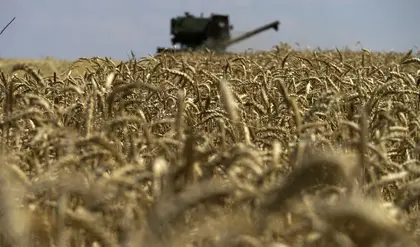A UN-chartered ship loaded with Ukrainian wheat destined for millions at risk of starvation in Ethiopia arrived in Djibouti on Tuesday.
The bulk carrier MV Brave Commander, which is carrying 23,000 tonnes of grain, docked in the Horn of Africa port city, the UN’s World Food Programme said, two weeks after leaving a Black Sea port in Ukraine.
JOIN US ON TELEGRAM
Follow our coverage of the war on the @Kyivpost_official.
“We have officially docked! The first WFP ship to carry Ukrainian grain since February has just arrived in Djibouti,” WFP executive director David Beasley said on Twitter.
“Now, let’s get this wheat offloaded and on to Ethiopia.”
The UN agency said food insecurity and malnutrition are a major concern across Ethiopia, with an estimated 20.4 million people in need of food support.
Ukraine, one of the world’s largest grain exporters, was forced to halt almost all deliveries after Russia’s invasion of the country in February, raising fears of a global food crisis.
Exports of grains and other foodstuffs and fertilisers from three Black Sea ports resumed at the start of this month under a deal between Kyiv and Moscow that was brokered by the UN and Turkey in July.
The agreement lifted a Russian blockade of Ukraine’s ports and set terms for millions of tonnes of wheat and other grain to start flowing from silos and ports.
According to figures late last week from the Joint Coordination Centre which manages the sea corridor, more than 720,000 tonnes of grain have already left Ukraine.

ISW Russian Offensive Campaign Assessment, December 24, 2024
– ‘No end in sight’ –
The WFP said earlier this month that the number of people at risk of starvation in the drought-ravaged Horn of Africa region has increased to 22 million.
“There is still no end in sight to this drought crisis, so we must get the resources needed to save lives and stop people plunging into catastrophic levels of hunger and starvation,” Beasley said at the time.
Ethiopia, Kenya and Somalia are experiencing their worst drought in 40 years and the UN’s World Meteorological Organization warned last week that the situation is set to get even worse with a fifth consecutive failed rainy season.
An unprecedented four failed rainy seasons have killed millions of livestock, destroyed crops, and forced 1.1 million people from their homes in search of food and water.
“Needs will remain high into 2023 and famine is now a serious risk, particularly in Somalia” where nearly half the population of 15 million is seriously hungry, the WFP said in a statement earlier this month.
Northern Ethiopia has also been wracked by conflict since November 2020 when Prime Minister Abiy Ahmed sent troops into Tigray to topple the Tigray People’s Liberation Front (TPLF) after what he said were attacks by the rebels on federal army camps.
You can also highlight the text and press Ctrl + Enter






